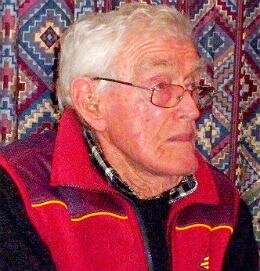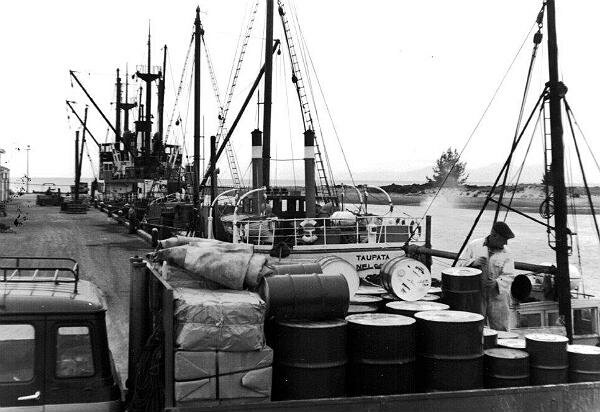[ Return ]
Jim Scott talks about his time on the Motueka Harbour Board

Jim Scott at Saturday's meeting
|
(May 24th 2014)
Report by Coralie Smith
Introduced to the 20 or so members of the Motueka and District Historical Society by Jennie Askew, Jim Scott explained how the Askews were a first settler family in Riwaka, arriving in 1842 whereas the Scotts didn't arrive until 80 years later.
They farmed on land over the Motueka Bridge and along on the right, past Lodder Lane about 500 metres. The house called "Cloverlea" is still there and the land is still in orchard although in a different fruit.
In 1956 Jim was running the orchard his father had run before him. The Motueka Harbour Board were having problems with an ongoing dispute between the harbour master and the secretary and it was decided that both would be relieved of their positions and a harbourmaster manager elected.
The Board at the time was made up of seven board members, five from the Waimea County Council ridings and two from the Motueka Borough Council.
Jim was approached by some local citizens to stand for the Harbour Board. He in turn talked about it with neighbours and fellow orchardists Steve Emerre, Kelvin Fry, Jim Chapman and Colin Mackay and they all stood along with Ern Stilwell and Charlie Kearns from Motueka. Much to their surprise they were all elected. Charlie Kearns was the only one from the original board to be re-elected. The public were obviously fed up with the legal disputes that were ongoing.
At the first meeting Jim was elected Chairman, becoming the youngest ever board member and chairman. To his consternation Jim learned that the harbourmaster and secretary had both been reinstated by the Employment Court. However, being young and confident and as an orchardist knowing the importance of keeping the port open to shipping, he was ready to take on the challenge.
Percy Williams was the harbourmaster and he was soon to retire which alleviated the situation, and the secretary had to be constantly reminded that he was only there because of the courts and so they would have to live with it. (Jim doesn't name the secretary so you will have to discover that for yourself.)
In 1916 Port Motueka had a new wharf built specifically as a fruit port. The former Old Wharf on the estuary just wasn't suitable for the bigger ships. The position of the new and present wharf was chosen because of the channel that poured water into the Moutere Estuary each tide.
It was dredged regularly as nature changed the drift of sand. (As an aside, Jim feels that the TDC will never resolve the Jackett Island erosion dispute as once again nature is a force too big to be reckoned with.)
The Anchor Shipping Company was the main shipping company in 1956, along with the Pearl Kasper Shipping Company, the Karamea Shipping Company and the Coastal Shipping Company. The ships that came and went were of all sizes. The Mamaku, the Taupata and the Himatangi are just a few that made regular calls at Port Motueka.
Apples were the main commodity shipped with bulk tobacco coming second. Rothmans and WD & HO Wills were the two tobacco companies involved. The Harbour Board supplied storage facilities for the two companies before the partly processed leaf was shipped to Wellington (Lower Hutt) for Wills and Napier for Rothmans.
The Guardian reporter Sue Clark wrote an article on Jim in 2011 for her Port Motueka series and she described Jim as Peacemaker and Devil's Advocate. He could understand the peacemaker title and presumes that the other title was because he was an orchardist who needed to get his apples overseas and he was on a board that soon wouldn't be able to do that as fast or as cheaply as Port Nelson which up until 1961 was not an export port, Motueka being the main port for the exporting apples.
In August 1962 something happened that was to change the history of Port Motueka dramatically. The first roll-on roll-off ferry called the Aramoana came into Picton. It virtually killed shipping in Motueka overnight. Rothmans straight away used it, Wills remained loyal mainly because of Charles Pethybridge who could see the importance of the port to Motueka.
The number of apple cases being put across the wharf per year dropped from 500,000 to 150,000 and with it the revenue. By 1965 discussions were taking place as to what should happen to Port Motueka and who should run it. The Nelson Harbour Board was keen to be in charge as it saw it as a non-rateable asset.
However the Waimea County, the Motueka Borough and the Local Bodies Commission saw it differently. Instead a committee of four was set up consisting of the Motueka mayor, the County chairman, a county representative and Jim Scott. They looked after the port from 1966-68.
The Nelson Harbour Board appealed the earlier decision and this time the commission came down on their side. It remained non-rateable. Jim and Colin Mackay were elected to the Nelson Harbour Board as County reps. Derek Smith decided he would stand for mayor of Motueka instead but wasn't successful there.
Jim and Colin spent another 15 years doing port business. Jim was on the Offport committee looking after Mapua and Motueka and served a term as Vice Chairman. He was quite relieved though when in 1983 he wasn't re-elected, thus ending 27 years on harbour boards.
Jim showed us a book written by Rob Williams, who had looked after Port Motueka in later years. Son of Percy, he writes verse about the ships and men who made history at Port Motueka in its heyday.
Tom Rowling also spoke briefly about his time at Port Motueka spending his first year on ships going in and out of Motueka. He has only just retired from a career spent at sea. He helped Rob Williams produce his book and both will be kept in mind as speakers in the future.

Loading the Taupata, Motueka c.1950

Ship ready to be loaded with apples, Motueka c.1950
[ Return ]